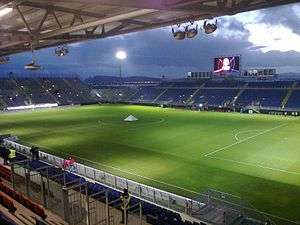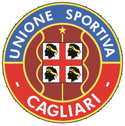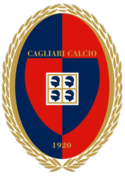Cagliari Calcio
 | ||||
| Full name | Cagliari Calcio S.p.A. | |||
|---|---|---|---|---|
| Nickname(s) |
I Rossoblu (The Red and Blues) Gli Isolani (The Islanders) I Sardi (The Sardinians) Castéddu (Sardinian name for Cagliari) | |||
| Founded | 30 May 1920 | |||
| Ground | Stadio Sant'Elia | |||
| Capacity | 16,000 | |||
| Owner | Tommaso Giulini | |||
| President | Tommaso Giulini | |||
| Head coach | Massimo Rastelli | |||
| League | Serie A | |||
| 2015–16 | Serie B, 1st (promoted) | |||
| Website | Club home page | |||
|
| ||||
Cagliari Calcio (Italian: [ˈkaʎʎari]; Sardinian: Casteddu) is an Italian football club based in Cagliari, Sardinia. The club currently plays in Serie A.
They won their only Scudetto in 1969–70, when they were led by the Italy national team's all-time leading scorer, Luigi Riva. The triumph was also the first by a club from south of Rome. Cagliari's colours are blue and red. The club's stadium is the 16,000 seat Stadio Sant'Elia in Cagliari. During the 2012–13 season, however, the team temporarily played their home games at the Stadio Is Arenas, in Quartu Sant'Elena.
The club's best European performance was in the 1993–94 UEFA Cup, losing in the semi-finals to Internazionale.
History
Before Serie A
Cagliari became the first ever out-right champions of Serie C during the 1951–52 season; prior to that in the league, the championship was shared amongst more than one team. They spent the 1950s from then on in Serie B, losing a promotion play-off in 1954. After descending to Serie C in the early 1960s, Cagliari's rise would be meteoric, eventually achieving promotion to Serie A in 1964.
First Serie A adventure: 1964–1976
The squad for the Rossoblu's debut season in Serie A featured players like defender Mario Martiradonna, midfielders Pierluigi Cera, Nené and Ricciotti Greatti, and forward Luigi Riva. A poor first half of the season, however, saw Cagliari in last place with nine points at the halfway mark. An astonishing second half of the season saw Cagliari defeat the likes of Juventus and Milan and finish in seventh place with 34 points. Two seasons later, Riva finished as Serie A's top scorer for the first time while Cagliari finished with the league's best defensive record.
_-_CROPPED.jpg)
During the summer of 1967, Cagliari played a season in North America as part of a fledgling league called the United Soccer Association. This league from Europe and South America to play in American and Canadian cities, with each club bearing a local name. Cagliari played as the Chicago Mustangs, and finished joint second in the league's Western Division with 13 points, two behind the division champion and eventual league champion Los Angeles Wolves. The league's leading scorer was Chicago/Cagliari's Roberto Boninsegna, who scored ten goals while playing in 9 of the team's 12 games.
Cagliari first emerged as serious Serie A title contenders in 1968–69 with a three-horse race involving them, Fiorentina and Milan. Fiorentina would win the league, but the following season would bring ultimate glory. With Angelo Domenghini joining the side, Cagliari would win the title in 1970 with only two games lost, 11 goals conceded (the fewest in any major European league to date) and Riva as league top scorer once more. Players like Albertosi, Niccolai, Boninsegna, Gori, Cera, Domenghini and Riva played in Italy's 1970 World Cup final team.
The 1970s would see a gradual decline (though were title contenders two years after their one and only Scudetto win). Cagliari were finally relegated in 1976, with Riva's career having effectively ended during that season.
Up and down again: 1976–87
After relegation, Cagliari lost a play-off for promotion the following season and would return to Serie A in 1979. Players like Franco Selvaggi, Mario Brugnera (a survivor of the 1970 team) and Alberto Marchetti ensured a respectable four-year stay in the top flight before a second relegation in 1983. The 1980s would then prove to be a darker time compared to the previous two decades with relegation to Serie C1 in 1987.
There and back: 1987–2000
Cagliari spent two seasons in Serie C1. In the first one it barely avoided relegation in Serie C2. In 1988, Claudio Ranieri was appointed coach, and led the team to two successive promotions, to Serie B in 1989 and to Serie A in 1990. The first two seasons back in Serie A saw Cagliari fight relegation, with safety being achieved by excellent second half runs. But the 1992–93 season would see Cagliari fight for a European place and succeed under the management of Carlo Mazzone. The following season saw a run to the semi-finals of the UEFA Cup, unprecedented for the Sardinian club.
The next few years would see Cagliari return to mid-table anonymity, before a struggle in 1996–97 saw Cagliari relegated after losing a play-off to Piacenza. Once more they bounced back after just one year, but their next stay in Serie A lasted just two seasons.
Once and again: 2000 onwards
Cagliari spent the next four seasons in Serie B, for most part in mid-table mediocrity. But 2003–04 would see the Rossoblu, led by Sardinian-born Gianfranco Zola, mount a successful promotion challenge and the following season saw Cagliari hold their own in Serie A with a respectable mid-table finish. The following season was a quiet one for the Sardinians, they obtained a good mid-table position (12th place).

The 2005–06 season, the first without Zola, started in the worst way possible for Cagliari, who changed their manager three times, with Attilio Tesser, Daniele Arrigoni and Davide Ballardini alternating to the position of coach, before Nedo Sonetti, appointed in November, was able to save the team from a relegation thanks to goals from Honduran striker David Suazo. For the 2006–07 season, Marco Giampaolo was signed as head coach, however he was fired after the 17th match and replaced by Franco Colomba. However, after a number of poor performances which ended in a 2–0 home defeat to Lazio, Colomba was sacked, and chairman Cellino chose to reinstate Giampaolo as head coach. Giampaolo was confirmed for the 2007–08 season, and his contract was extended for two more years.
The 2007–08 season saw the flagship strikers David Suazo, Mauro Esposito and Antonio Langella leave for Internazionale, Roma and Atalanta respectively, and the experienced goalkeeper Chimenti leave for Udinese. The club reinforced itself with youngsters likes Robert Acquafresca, Alessandro Matri, Pasquale Foggia, Argentine Joaquín Larrivey and Slovenian Jan Koprivec. Nedo Sonetti returned to coach the Rossoblu in November 2007 after Giampaolo was relieved of his duties as a result of poor results in the first part of the 2007–08 Serie A season that saw them sink to the bottom of the Serie A standings. In the January transfer window, Cagliari made changes to their squad with goalkeepers Vincenzo Marruocco and Marco Fortin replaced by Marco Storari and Luca Capecchi, along with experienced striker Jeda, and the Sardinian midfielder Andrea Cossu. With these new players, Cagliari won many matches and continued their climb up the table eventually ending the season at 14th. The 2008–09 season saw Cagliari start their season badly, losing their first five matches. Despite their rough start, however, they went on to end the season at a comfortable ninth place, 19 points above relegation.
Cagliari's coach, Pierpaolo Bisoli, was fired on 15 November 2010 and replaced by former Italy and Napoli coach Roberto Donadoni, who was himself sacked on 12 August 2011.
Cagliari started the 2011–12 season with Massimo Ficcadenti as head coach, then replaced by comeback man Davide Ballardini. A few weeks before the end of season, however, Ballardini was removed as head coach due to poor results and Ficcadenti was reinstated. At the end of the season, Cagliari has played their home games at Stadio Nereo Rocco in Trieste, after the historical club stadium was closed down in March 2012. Cagliari used Stadio Is Arenas in Quartu Sant'Elena as its home venue for the 2012–13 season, coming back to the Sant'Elia (still under renovation) in the following season. Cagliari were relegated from Serie A in the 2014–15 Serie A season. They gained promotion back to Serie A the following season after finishing in first place in Serie B.[1]
Colours, badge and nicknames



The official red and blue colours of Cagliari mirror those featured on the stemma of Cagliari.[2] The red parts of the stemma are a reference to the coat of arms of the House of Savoy, a family which was previously the monarchy of Italy and more relevantly to Cagliari in particular, the Kingdom of Sardinia.[2] The blue part of the stemma features the sky and the sea, also a castle; this is because the old historic center of Cagliari is walled and called the Castello.[2] Due to the use of these colours on their shirt in halves, the club is commonly nicknamed rossoblu.[3]
Cagliari have had several different logo designs during their history, all of which feature the flag of Sardinia.[4] Usually the badge also features the club colours; if there is a change, the main difference has been the colour of the border or the shape.[4]
Currently, the badge features an "Old French"-shaped escutcheon with red and blue halves, with the club's name written in white just above the flag of Sardinia.[4] The moors heads have, for the first time, been turned to the right as of 2015 so as to match the Sardinian flag after it was updated in 1992.
Due to the fact that Cagliari are the main club from the island of Sardinia, they are nicknamed the "Isolani" ("Islanders").[5]
Honours
National titles
- Serie A:
- Serie B:
- Winners (1): 2015–16
- Runners-up (3): 1963–64, 1978–79, 2003–04
- Serie C / Serie C1:
- Winners (4): 1930–31, 1951–52, 1961–62, 1988–89
- Coppa Italia Serie C:
- Winners (1): 1989
- Campionato Sardo di I Divisione:
- Winners (1): 1936–37
European titles
- Semi-finalists (1): 1993–94
Players
Current squad
- As of 6 September 2016.
[6] Note: Flags indicate national team as defined under FIFA eligibility rules. Players may hold more than one non-FIFA nationality.
|
|
On loan
Note: Flags indicate national team as defined under FIFA eligibility rules. Players may hold more than one non-FIFA nationality.
|
|
Retired numbers
11 – ![]() Luigi Riva, Forward, 1963–78
Luigi Riva, Forward, 1963–78
Notable former players
Including only players with at least 100 appearances in the club, or an appearance in a FIFA World Cup edition
- Enrico Albertosi
- Davide Astori
- Davide Biondini
- Roberto Boninsegna
- Massimiliano Cappioli
- Pierluigi Cera
- Andrea Cossu
- Angelo Domenghini
- Mauro Esposito
- Antonio Langella
- Alberto Marchetti
- Federico Marchetti
- Gianfranco Matteoli
- Francesco Moriero
- Roberto Muzzi
- Comunardo Niccolai
- Giuseppe Pancaro
- Luigi Piras
- Luigi Riva
- Franco Selvaggi
- Pietro Paolo Virdis
- Cristiano Zanetti
- Gianfranco Zola
- Radja Nainggolan
- Luís Oliveira
- Nené
- Patrick Mboma
- Gerry Hitchens
- François Modesto
- Jonathan Zebina
- Fanis Katergiannakis
- David Suazo
- Julio Dely Valdés
- Alberto Gallardo
- Julio César Uribe
- David Nyathi
- Eric Tinkler
- Marco Pascolo
- Ramon Vega
- Nelson Abeijón
- Daniel Fonseca
- Enzo Francescoli
- José Herrera
- Diego López
- Fabian O'Neill
- Darío Silva
- Waldemar Victorino
Presidential history
Cagliari have had numerous presidents over the course of their history, some of which have been the owners of the club, others have been honorary presidents, here is a complete list of them:[7]
- Antonio Zedda (1921)
- Gaetano Fichera (1920–21)
- Giorgio Mereu (1921–22)
- Angelo Prunas (1922–24)
- Agostino Cugusi (1924–26)
- Vittorio Tredici (1926–28)
- Carlo Costa Marras (1928–29)
- Enzo Comi (1929–30)
- Giovan Battista Bosazza (1930–31)
- Guido Boero (1931–32)
- Vitale Cao (1932–33)
- Enrico Endrich (1933)
- Pietro Faggioli (1933–34)
- Aldo Vacca (1934–35)
- Mario Banditelli (1935–40)
- Giuseppe Depperu (1940–43)
- Eugenio Camboni (1944–46)
- Umberto Ceccarelli (1946–47)
- Emilio Zunino (1947–49)
- Domenico Loi (1949–53)
- Pietro Leo (1953–54)
- Efisio Corrias (1954–55)
- Ennio Dalmasso (1955–57)
- Giuseppe Meloni (1958–60)
- Enrico Rocca (1960–68)
- Efisio Corrias (1968–71)
- Paolo Marras (1971–73)
- Andrea Arrica (1973–76)
- Mariano Delogu (1976–81)
- Alvaro Amarugi (1981–84)
- Fausto Moi (1984–86)
- Luigi Riva (1986–87)
- Lucio Cordeddu (1987)
- Antonio Orrù (1987–91)
- Massimo Cellino (1991–05)
- Bruno Ghirardi (2005–06)
- Massimo Cellino (2006–14)
- Tommaso Giulini (2014–present)
Managerial history
Cagliari have had many managers and trainers, some seasons they have had co-managers running the team, here is a chronological list of them from when they founded in 1920 onwards.[8]
- Gaetano Fichera (1920–21)
- Giorgio Mereu (1921–23)
- Angelo Colombo (1923–26)
- Natale Archibusacci (1926–27)
- Róbert Winkler (1927–30)
- Egri Erbstein (1930–32)
- András Kuttik (1932–34)
- Enrico Crotti (1934–35)
- Ferenc Molnár (1935)
- Roberto Orani (1935–36)
- Renato Bonello (1936–38)
- Róbert Winkler (1938–39)
- Mariolino Congiu (1939–41)
- Mariolino Congiu, Enrico Corrias (1941–42)
- Mariolino Congiu (1942–46)
- Raffaele D'Aquino (1946–48)
- Róbert Winkler (1948–49)
- Armando Latella (1949–50)
- Mariolino Congiu (1950)
- Enrico Carpitelli (1950–51)
- Mariolino Congiu (1951)
- Federico Allasio (1951–54)
- Vincenzo Soro (1954)
- Carlo Alberto Quario (1954–55)
- Silvio Piola (1955–56)
- Carlo Rigotti (1956–57)
- Silvio Piola (1957)
- Mariolino Congiu (1957–58)
- Piero Andreoli (1958)
- Stefano Perati (1958–60)
- Carlo Rigotti (1960–61)
- Arturo Silvestri (1961–66)
- Ettore Puricelli (1967–68)
- Manlio Scopigno (1968–72)
- Edmondo Fabbri (1972–73)
- Giuseppe Chiappella (1973–75)
- Luigi Radice (1975)
- Luis Suárez (1975–76)
- Mario Tiddia (1976)
- Lauro Toneatto (1976–78)
- Mario Tiddia (1978–81)
- Paolo Carosi (1981–82)
- Gustavo Giagnoni (1982–83)
- Mario Tiddia (1983–84)
- Fernando Veneranda (1984–85)
- Renzo Ulivieri (1985–86)
- Gustavo Giagnoni (1986–87)
- Enzo Robotti (1987–88)
- Mario Tiddia (1988)
- Claudio Ranieri (July 1, 1988 – June 30, 1991)
- Massimo Giacomini (1991)
- Carlo Mazzone (1991–93)
- Luigi Radice (1993–94)
- Bruno Giorgi (1994)
- Óscar Tabárez (July 1, 1994 – June 30, 1995)
- Giovanni Trapattoni (July 1, 1995 – Feb 13, 1996)
- Bruno Giorgi (1996)
- Gregorio Pérez (July 1, 1996 – Jan 1, 1997)
- Carlo Mazzone (Oct 23, 1996 – June 30, 1997)
- Giampiero Ventura (July 1, 1997 – June 30, 1999)
- Óscar Tabárez (July 1, 1999 – Sept 15, 1999)
- Renzo Ulivieri (1999–00)
- Gianfranco Bellotto (2000–01)
- Giuseppe Materazzi (2001)
- Antonio Sala (2001–02)
- Giulio Nuciari (Oct 28, 2001 – Dec 23, 2001)
- Nedo Sonetti (2002)
- Giampiero Ventura (July 1, 2002 – Dec 1, 2003)
- Edoardo Reja (July 1, 2003 – June 30, 2004)
- Daniele Arrigoni (2004 – June 30, 2005)
- Attilio Tesser (July 1, 2005 – Aug 29, 2005)
- Daniele Arrigoni (Aug 29, 2005 – Sept 16, 2005)
- Davide Ballardini (Sept 15, 2005 – Nov 8, 2005)
- Nedo Sonetti (Nov 12, 2005 – June 30, 2006)
- Franco Colomba (Dec 17, 2006 – Feb 26, 2007)
- Marco Giampaolo (Feb 26, 2007 – Nov 13, 2007)
- Nedo Sonetti (2007)
- Davide Ballardini (Dec 28, 2007 – June 30, 2008)
- Massimiliano Allegri (May 29, 2008 – April 13, 2010)
- Giorgio Melis (April 13, 2010 – June 30, 2010)
- Pierpaolo Bisoli (June 23, 2010 – Nov 15, 2010)
- Roberto Donadoni (Nov 16, 2010 – Aug 12, 2011)
- Massimo Ficcadenti (Aug 16, 2011 – Nov 8, 2011)
- Davide Ballardini (Nov 9, 2011 – March 11, 2012)
- Massimo Ficcadenti (March 11, 2012 – Oct 3, 2012)
- Ivo Pulga (Oct 3, 2012 – June 30, 2013)
- Diego López (July 1, 2013 – April 6, 2014)
- Ivo Pulga (April 6, 2014 – June 20, 2014)
- Zdeněk Zeman (June 20, 2014 – Dec 23, 2014)
- Gianfranco Zola (Dec 24, 2014 – March 9, 2015)
- Zdeněk Zeman (March 9, 2015 – April 21, 2015)
- Gianluca Festa (April 22, 2015 – June 12, 2015)
- Massimo Rastelli (June 12, 2015–present)
World Cup winners
References
- ↑ http://www.football-italia.net/83938/cagliari-back-serie
- 1 2 3 "Stemma Provincia di Cagliari". Comuni-Italiani. 24 June 2007.
- ↑ "Cagliari, e' Matri il primo colpo rossoblu: arriva dal Rimini". Eurosport. 24 June 2007.
- 1 2 3 "Cagliari Calcio". WeltFussballArchiv.com. 24 June 2007.
- ↑ "Cagliari Calcio". About.com. 24 June 2007.
- ↑ "Prima squadra" [First team]. Cagliari Calcio (in Italian). Retrieved 10 January 2012.
- ↑ "Presidenti". CalcioCagliari.it. 8 Jun 2007.
- ↑ "Allenatori Dal 1920 Ad Oggi". CalcioCagliari.it. 27 Aug 2007.
External links
| Wikimedia Commons has media related to Cagliari Calcio. |